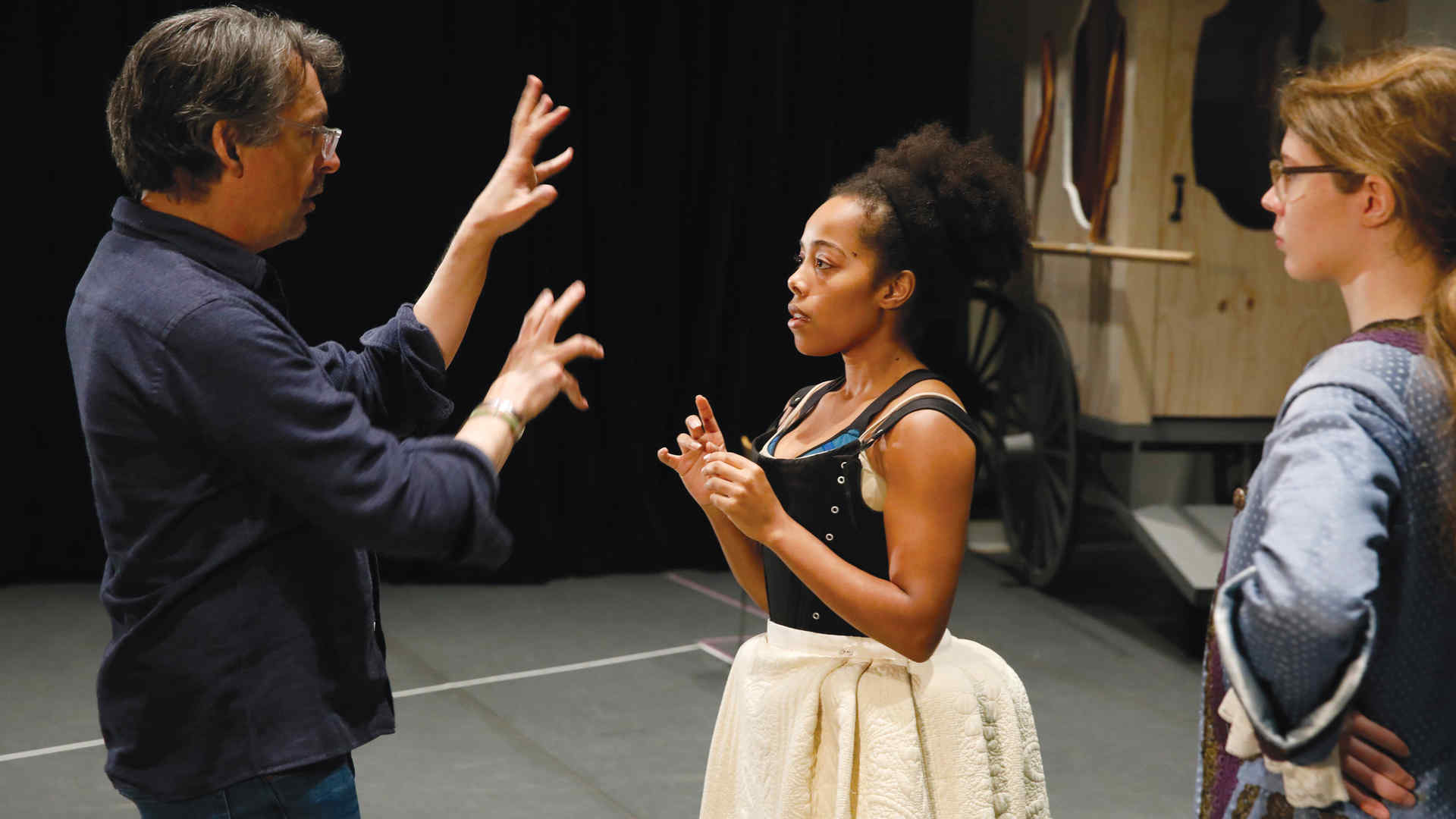
Noted director Stephen Wadsworth on helming the fourth-year actors in Pierre Carlet de Marivaux's Enlightenment comedy The Triumph of Love
From an early age I seemed to have a date with destiny in the early 18th century. The operas of Handel started appearing on LP in the 1950s and ’60s, and I saved up and bought them one by one. Mozart’s operas were the first that I saw in the theater, and they ruled supreme in my world, but Handel got under my skin. These early Enlightenment stories of people struggling between reason and passion, between rational thinking and madness, between wise, selfless loves and self-centered needs—were the first full-fledged dramas I knew. I didn’t know why I was drawn to them or even what about them compelled me, but I knew it went beyond the dazzling and infinitely moving music. Not until I staged a series of them in the 1980s and ’90s did I begin to figure out why.
Handel, a German, was writing Italian operas for an English-speaking audience in London. Across the channel his exact contemporary Pierre Carlet de Marivaux was writing plays in French for an Italian company that had only recently started performing in French. Marivaux married the Italian theater and its gutsy, lusty commedia dell’arte types to the French tradition of Racine and Corneille with its refined, rhetorical style and dramas of dilemma and decision. Both Handel and Marivaux were deft with comedy but rarely wrote anything you could simply call a comedy. Both met the dark in everything they wrote, and if they could be said to be writing consistently about one thing, that one thing would be change—changes of allegiance, changes of worldview, changes of heart, changes of life.
Change, possibly violent change, was the dangerous undercurrent of the early Enlightenment, and philosophers, writers, and artists began to realize that was imminent. In the 17th century science and logic had come to dominate thinking about the natural world. Biblical explanations were debated, and the evolving Enlightenment worldview teased conclusions from scientific discovery. If a terrier and a Great Dane were both dogs and in that sense equal, couldn’t the same be said about human beings? And if human beings were in that sense equal, what did that suggest about the prevailing economic, political, and social systems, which granted to the aristocracy and the church ownership of nearly everything, including many other human beings. To follow that line of thinking meant change, and in my view the art of the Enlightenment, increasingly articulate in form and complex in content, is haunted—and lit from within—by an awareness that European life was gradually reordering itself, indeed preparing itself for a death and a rebirth.
In Paris, the epicenter of European intellectual life, Marivaux got this, and explored it all in a series of plays in which the arena for change is love. Many of the plays deal with class and gender politics as well, but the juxtaposition of low comedians and well-born men and women was the face of every one of them, and this image was itself radical—upper and lower classes were bonding and mixing. In the paintings of Marivaux’s contemporary Jean-Antoine Watteau, ladies of station dallied with rustic actors in dark, mysterious gardens, and Marivaux’s plays presented the same image of different classes in suggestive romantic situations. This idea, of course, is the germ of democracy, and even though it wasn’t until Napoleon righted the wrongs of the French Revolution that democracy started to flourish in Europe (thanks in no small part to the example of the brand-new United States), the race for liberty-and-justice-for-all was on.
And there I was in the 1980s and early ’90s, watching as Ronald Reagan started to reframe the pursuit of happiness and the reasons for democracy and to preach what seemed to me profoundly undemocratic fallacies, such as trickle-down economics. I wondered what had happened to the flag to which I’d spent my youth pledging allegiance. I was having a crisis of faith: these United States seemed to be fundamentally different, or at least changing radically, and I was reaching back into the Age of Reason to remind myself of the ideas that had united them in the first place.
America’s relationship to France was symbiotic in the 18th century: Europe’s most populous and sophisticated country offered the world’s newest and most progressive country ideas and spiritual encouragement, which were ferried back to the colonies by Benjamin Franklin, Thomas Paine, Lafayette, and many others. We couldn’t have declared our independence so eloquently without this philosophical transfusion, and France could not have undertaken its revolution without the example of ours.
In The Triumph of Love didactic thinkers are brought to their knees when their hearts are coaxed open, and Marivaux reminds France that rigid doctrine is antithetical to growth. Thinking without the heart cannot work. In Marivaux’s characters—fighting to understand what is happening to them and to accept the sobering notion of change at great cost to themselves—we can see the image of Enlightenment Europe. And take comfort in contemplating a world in which love, difficult as it can be to manage, is the key to self-knowledge, balance, growth, and freedom. Handel’s and Marivaux’s work often presses these mandates into the hands of rulers and powerful people, chastening and tempering them, so they could be true leaders. I needed to drink at this well.
Vocal Arts faculty member Stephen Wadsworth was made a Chevalier de l’Ordre des Arts et des Lettres by the government of France for his services to French literature; his translation of Molière’s Don Juan (Smith and Kraus) comes out in December
Get tickets for $20 or less to see Pierre de Marivaux's Triumph of Love, December 7-11 at Juilliard